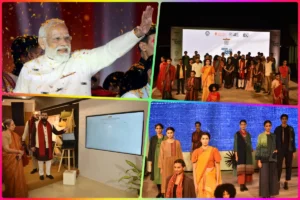
New Delhi World Book Fair 2024 – Multilingual INDIA
With people making a beeline to witness the richness in visual appeal and in content, the beautifully designed THEME Pavilion at New Delhi World Book Fair 2024 – Multilingual INDIA: A Living Tradition (Bahubhashi Bharat: Ek Jeevant Parampara) is an experience in itself. India is the world’s most linguistically diverse country with 121 recognised languages and its multilingual milieu has been globally accepted. India’s multilingual heritage is an epitome of the country’s ability to nurture diverse traditions that enables the existence of a pluralistic society. The THEME Pavilion at NDWBF 2024 celebrates the linguistic heritage of India through diverse exhibits that bring forth various aspects of the multilingual milieu in the country. It traces the historic origins of this milieu through instances of multilingual inscriptions from ancient, medieval and contemporary India. The numerous languages, their origins, literatures, and authors, are highlighted through individual exhibits covering some of the major litterateurs and linguists.
The events being held at Theme Pavilion are aimed at sparking curiosity and providing glimpses of linguistic diversity of India, and to instill a sense of pride in one’s mother tongue and convey that knowledge transcends language boundaries. Today’s discussion on ‘India’s Multilingual Living Traditions’ had an international purview with panelists being Óscar Pujol, Emma House, Nadim Sadek, Michael Pal and Rubin D’Cruz. There is a need to create a tradition of translation among Indian and European languages other than English, said Óscar Pujol, the Spanish Author who translated Bhagavad Gita into Spanish. “Translation is the bridge to a multilingual world, it is both an art and a technique,” he emphasized. Michael Pal highlighted the importance of mother tongue as medium of learning in foundational years for a multilingual capacity, and subsequently introducing other languages in the curriculum. This aligns with the National Education Policy 2020 which promotes education in the mother tongue and forms the basis of a multilingual, multicultural world-view. Emma House spoke on the rich linguistic and cultural diversity of India and said that this needs to be disseminated across the world.
In another session, there was a book discussion on ‘Pranab My Father: A Daughter Remembers’ by Smt. Sharmistha Mukherjee, a prolific author and daughter of the former President of India. The discussion furnished fresh perspective through various personal and political anecdotes, revealing a new emotional yet strong dimension to the former President of India. Sharmistha Mukherjee emphasized that her father possessed the capacity to listen, comprehend, and even if not fully agree, acknowledge opposing perspectives.
Children were as much a part of the festivities at NDWBF as were the adults. The activities at the dedicated Children’s Pavilion in Hall 3 had captivating storytelling session by Ms. Usha Chhabra, with her skillful use of props and engaging voice modulation, making children want more. The Pavilion also hosted various other activities, including a Cyber Quiz, a Puppet Show, a Science Quiz Quest, and Yuva Sampadak Karyashala. In addition, a drawing competition centered on the United Nations’ 17 Sustainable Development Goals, highlighting India’s commitment to global governance and the importance of instilling principles of sustainability in children through creative means, was also hosted in collaboration with Discovery Kids.
The International Events Corner saw a few interesting sessions – an informative discussion on Iran’s Publishing Industry featuring Prof. Aleem Ashraf Khan, Dept. of Persian, Delhi University who highlighted the prominence of Persian in the Indian literary landscape. He lauded the Government of India for recognizing Persian as one of the 9 classical languages in India under the New Education Policy 2020. Another session by Austrian Embassy was an interactive session with Indian authors followed by readings of an Austrian novel adapted into Hindi, fostering intellectual exchange and multicultural dialogue.
At the Festival of Festivals programme at Authors’ Corner, by the Pragati E Vichaar Literature Festival, discussions intricately linked the narratives of history, heritage, and publishing. A notable takeaway from the discussions was the distinction drawn between History and Heritage. Esteemed heritage activist, Mr. Vikramjit Singh Rooprai, said that actively engaging with and understanding history drives its evolution, thereby shaping our heritage. The session concluded with Ms. Trisha De Niyogi, CEO, Niyogi Books, reciting a quote of Dr. B.R. Ambedkar, encapsulating the essence of the discussion: “They cannot make history who forget history.”
The cultural evening came alive with mesmerizing performances. Transcending linguistic and regional boundaries, featuring a Puppeteering Group from Alwar, Rajasthan, renowned for their performances worldwide in languages including French, Swedish, English, and Italian. Anotehr was Sadho, a folk fusion band, mesmerized the audience with their renditions of Indian classical and folk music. Meanwhile, Space Folk Ensemble from Jammu & Kashmir captivated spectators with vibrant folk dances representing the rich cultural heritage of India.
The NDWBF 2024 has notable dignitaries, celebrities, scholars, litterateurs, officials, and other avid book lovers visiting the fair halls. Among them include Swami Avdeshanand, Shri J.P. Nadda, Dr Mansukh Mandaviya, Rajat Sharma, Adah Sharma, Saurabh Dwivedi, and many more.
NDWBF 2024 is open till 18 February 2024 at Pragati Maidan, Halls 1 to 5. There are books from more than 1000 publishers for all age-groups and in all languages. Entry is FREE for children in school uniform, senior citizens and for differently-abled. Tickets are available online at ITPO website and at select Metro Stations.
To read more such news, download Bharat Express news apps





















